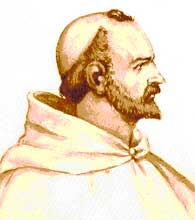 After the death of Lucius the cardinals withdrew to the Monastery of St.
Caesarius where, protected by Frangipani swords, they could elect a pope in
peace. The election was speedy and surprising.
After the death of Lucius the cardinals withdrew to the Monastery of St.
Caesarius where, protected by Frangipani swords, they could elect a pope in
peace. The election was speedy and surprising.
Quickly the cardinals chose, not one of their own number, but Bernard, the
Cistercian abbot of St. Anastasius. He took the name Eugene III. Bernard
Paganelli was born in Pisa. He was a canon of the cathedral there and a high
official when he met St. Bernard. This meant a radical change. He resigned his
high offices to follow St. Bernard, that spiritual pied piper, into a Cistercian
monastery. When Innocent II asked St. Bernard to send Cistercians to Rome, it
was Bernard Paganelli who led the monks to St. Anastasius. There he attracted
many vocations and the monastery was flourishing when Bernard was elected pope.
Eugene was a man of real holiness, humble, kindly, and cheerful. If he was
severe, he was severe on principle as when he deposed the archbishops of Mainz
and York. He accomplished much for the church. He might have done more if he had
not been so troubled by the perennial Roman problem. Eugene had to go to Farfa
to be consecrated in peace. But soon, tired of the excesses of Jordan, the
Patrician, the Romans welcomed the Pope back and agreed to a compromise. The
office of Patrician was abolished. The senate was to remain but to acknowledge
the lordship of the Pope. This did not work well and soon the disgusted Pope
once more left the city. The fall of Edessa. a bastion of the crusader kingdom,
had alarmed Europe. Eugene proclaimed the second crusade. St. Bernard preached
it. Louis VII of France and Emperor Conrad III were its leaders. Weak leaders
they proved to be. The Germans were cut up in Asia Minor, the French butchered
in a mountain defile. Louis and Conrad reached Jerusalem indeed, but rather as
pilgrims than war leaders. The crusade which had begun in hope ended in
disillusionment. So keenly did Eugene feel this that he left France.
The Pope was active in promoting the spiritual welfare of the church. He
received an embassy from the Catholic Armenians and sent those good people a
letter of instruction. He arranged discussions with the Greeks. He held a
council at Rheims at which the Trinitarian vagaries of Gilbert de la Porree were
condemned. On the other hand the pope approved of the visions of the holy mystic
Hildegarde. Though he had actually been guardian of France during the crusade,
Eugene could not control his own city. Arnold of Brescia, whom the pope had once
pardoned, was now the idol of the factious Romans. Diplomacy and a show of force
enabled Eugene to enter Rome once more in 1149, but he had so hard a time
keeping order that he appealed to Conrad to come down and settle matters. The
Emperor died before he could do so. His nephew and successor agreed to come into
Italy. He was to come many times and the popes would not be pleased. Conrad's
successor was Frederick Barbarossa. Blessed Eugene died at Tivoli July 8, 1153.
He was buried in St. Peter's with great marks of veneration.
Excerpted from "Popes
Through the Ages" by Joseph Brusher, S.J.

